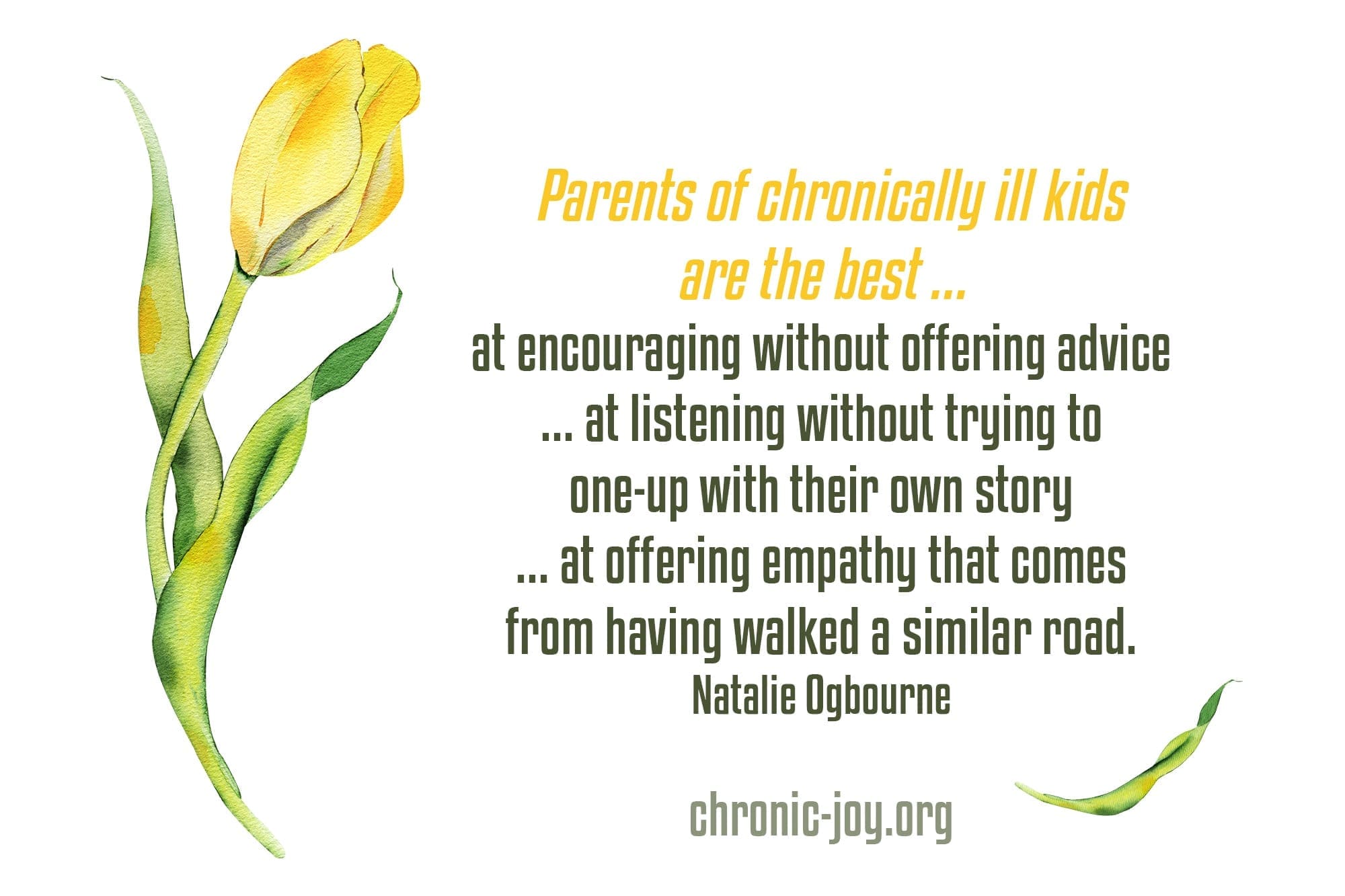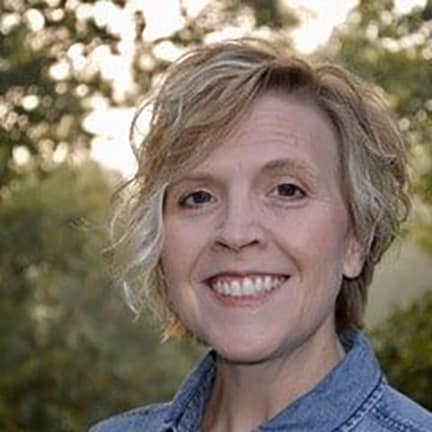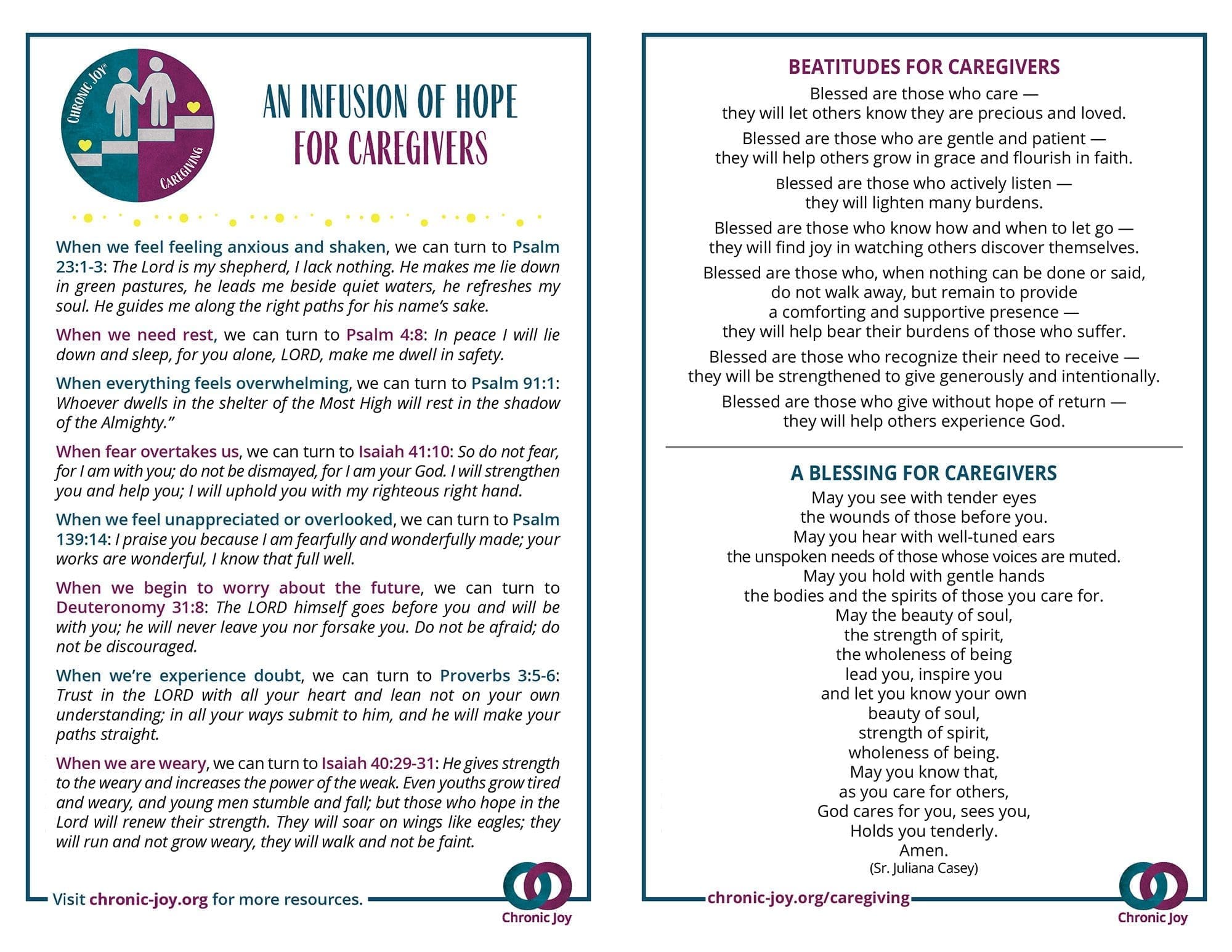
“Parents of chronically ill kids are the best … at encouraging without offering advice … at listening without trying to one-up with their own story … at offering empathy that comes from having walked a similar road.” Natalie Ogbourne
IF YOU EVER NEED TO TALK
Slowly, I made my way down the corridor toward the Sunday School room, uncertain if I wanted to go in. It was the first Sunday of the school year and my first day in a new class in our relatively new church. Raw and exhausted from the rigors of the previous six months and the realities of the last seven days, I had little desire to sit among the established members of the mom’s prayer group I’d opted to join.
Six months before, both my daughters had been struck with health issues leading to diagnoses of painful and potentially debilitating chronic illnesses — and the past week had brought new and worsening symptoms for both of them.
When it was my turn to tell a little about myself, the “about myself” was really about our family’s journey into chronic illness. “It’s been a rough year so far, and the past few days have been overwhelming. Don’t be surprised if I just sit and listen to you pray rather than try to pray myself.”
That is what I did — only I didn’t just listen. I wept until the class ended and I was free to leave.
I had almost made it out the door when another mom said, “Hold on, Natalie.” Her name was Leisa, and although I’d never met her, I knew who she was. I had prayed for her daughter, who had been in the university hospital battling a chronic condition during the previous fall and winter.
Leisa continued, “I was at a conference once where the speaker had gone blind when she was fifteen. In the middle of her presentation, she said she had something to say to those of us who had sick kids. She said that most of the time, it’s harder for the moms than the kids.”
She paused. I don’t remember what I said or if I said anything. All I knew was that something inside me relaxed — and I was grateful.
Then Lesia said something else. “I’ve been at this a few years, so I have a lot of experience finding my way around the medical system. If you ever need to talk . . .” Again, I was grateful.
I didn’t need to talk, at least not then — but I did need to know I wasn’t alone.
IF YOU EVER NEED TO TALK: FINDING EMPATHY
At that moment, I began to sense something time has revealed to be true: parents of chronically ill kids are the best people. They’re the best at encouraging without offering advice. They’re the best at listening without trying to one-up with their own story. They’re the best at offering empathy from having walked a similar road. I could learn from these parents.
I am learning from them.
None of us would choose this life — not for ourselves and especially not for our children.
The clay, however, does not get to choose (Isaiah 45:9). It only knows it is being formed. No matter what it is being made into, it must first be wedged to make it more pliable, to work out any hard places, and to remove any pockets of air that would cause it to explode in the kiln. Wedging (a process involving throwing the clay down hard and repeatedly, cutting it apart, and rolling it up again and again) prepares the clay for the shaping process. Only after being worked and worked again is the clay ready to be molded, glazed, and kilned.
None of this fits my romantic notion of the potter at the wheel, damp and curved clay in his cupped hands, gently shaping it into his vision for use and loveliness. It seems more like an exercise in suffering. It resembles life with chronic illness and mirrors living in the painful tension of the mystery that God works what is not good together for good.
IF YOU EVER NEED TO TALK: FINDING COMFORT
We are comforted that we might comfort others (2 Corinthians 1:3-4). Parents of chronically ill kids receive this comfort far too early in their children’s lives. For this reason, we are uniquely equipped to comfort others, if only by sharing the much-needed truth they are not alone in their suffering.
A year after my conversation with Leisa, my daughter decided it would be best for her to take a year off from competitive robotics to focus on restoring her physical and emotional health. She was part of a world-class team and had been a team captain. Her dad was one of the coaches. Both she and my husband grieved, even though they knew she had made the right choice.
Not long after this, my husband got a call from a robotics friend asking him to expand his involvement in the organization. When my husband told him he wouldn’t be participating that year and why, his friend’s upbeat, let’s-do-this tone quieted.
“I’m sorry,” he said. “We’ve been walking through juvenile diabetes for eight years. I know it’s a lot. If you ever need to talk . . .”


Natalie Ogbourne
Natalie is a wife, a mom, and a reluctant hiker who has learned that finding her way in the woods helps her walk by faith in everyday life. She writes and speaks to encourage others to navigate the landscape of life by faith rather than on autopilot.

An Infusion of Hope for Caregivers
God knows how overwhelming caregiving can be, how it can throw the whole balance of our lives inside out and upside down. As caregivers, we need a steady infusion of hope from God's word to do the work He has called us to do.

Recent Comments